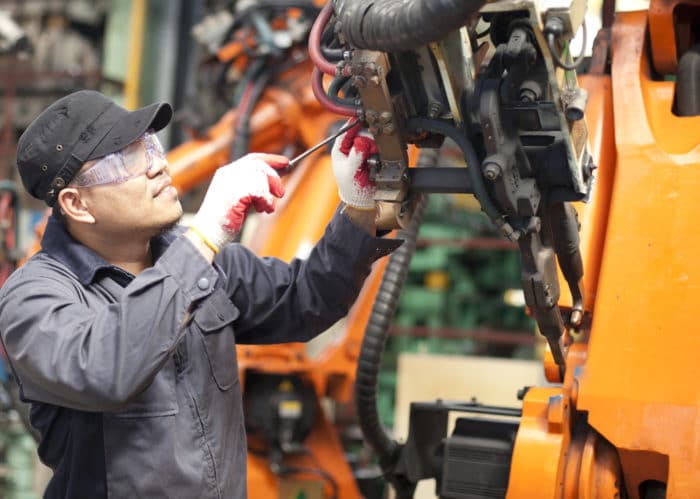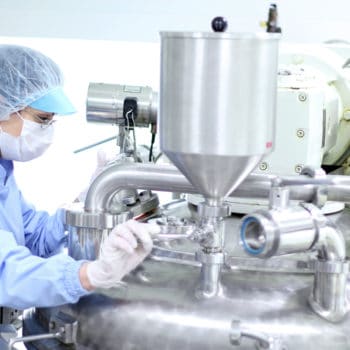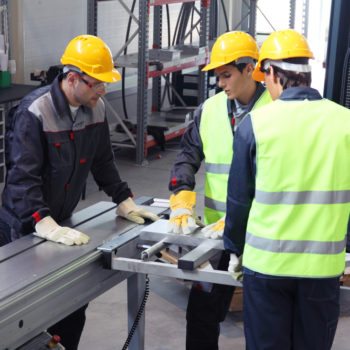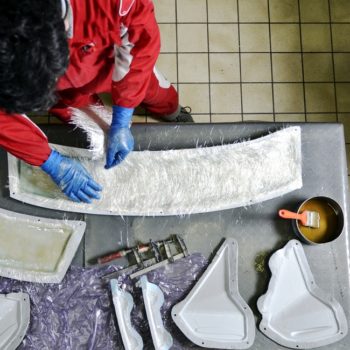Why We Love It
-
$51,470Potential Avg. Salary
-
18%Job Growth Rate
-
Growing DemandJob Outlook
-
Don't Take Work HomeCareer Attribute
An industrial machinery mechanic takes on the maintenance and repair of a wide range of factory equipment and related industrial machines like production machinery, conveyor systems, motors, packaging machines, etc.
Recommended Schools
What is an Industrial Machinery Mechanic?
Duties
One has to perform a variety of tasks related to the trade of an industrial equipment Mechanic, which includes:
- Closely monitor and repair machinery or mechanical equipment such as pneumatic tools, production machines, engines and motors.
- Accurately interpret and apply the specifications mentioned in technical manuals, diagrams, shop directives, sketches, operation manuals, and manufacturer’s blueprints to determine key parts.
- Properly dismantle various devices to access the interiors and remove or fix any defective parts with the help of cranes, power tools and hoists.
- Keep detailed operational logs, repair logs and preventative maintenance logs to share with supervisor and team for inventory purposes.
- Assess machinery and equipment parts to determine any incorrect alternations in critical dimensions, utilizing measuring instruments like calipers, rulers, etc.
Day In The Life
As an industrial machinery mechanic, your primary task is to ensure that all machinery and equipment under your purview are functioning smoothly. To this end, you will be inspecting each product and machine at regular intervals for errors, damages and inconsistent production. You will frequently take the help of technical manuals and guidebooks to enhance your understanding of an industrial equipment needing repairs. For instance, if you hear a loud vibration in a machine, it is up to you to figure out what the cause of the problem is – is it a faulty motor bearing or worn out conveyor belts? Machines that you will commonly spend time working on include hydraulic lifts, robotic welding arms and automobile assembly conveyor belts, etc.
With advances in computerized diagnostic technology and vibration analysis, it is much easier for industrial machinery mechanics today to understand the source of the issue. Once you diagnose what is wrong with an equipment or machine, it is up to you to take it apart and correctly repair and replace the required parts. You must have a good understanding of computer programming and electronics to seamlessly repair complex pieces of equipment. Soon after the repairs are done, you must also run tests to ensure that it is back to good working order. Thus, preventative maintenance also falls under your day-to-day duties.
Work Schedule
As an industrial machinery mechanic, you will usually find full-time positions with standard working hours. Hours range from Monday to Friday, between 8 am – 4:30 pm. However, it is essential that you remain on call and may have to work late nights and weekends based on demand. Overtime is not unusual for mechanics.
Due to the nature of the work, industrial machinery mechanics are more likely to suffer injuries through their career, ranging from sprains, bruises, cuts and fractures in case of an unfortunate accident. You must be comfortable working in uncomfortable positions like poised on the top of a ladder or working underneath big equipment. To minimize the risks, most workers are required to closely follow safety protocols like wearing a protective helmet, safety glasses or hearing protectors.
Growth Of The Job
Industrial machinery mechanics can look forward to good job prospects in the years to come. Their employment is projected to grow at 18% over the next decade – much quicker than the average for other occupations. Due to factories and warehouses adopting complicated and sophisticated equipment for manufacturing, more mechanics will be in demand to ensure that every part is working effectively.
Typical Employers
In this role, you can find work with refineries, manufacturing units, factories, food processing facilities, construction sites and power plants. Those having taken high school and post-secondary coursework in relevant subjects like computer programming, mathematics and mechanical drawing would have a distinct advantage over other candidates.
Recommended Schools
How To Become an Industrial Machinery Mechanic
You must at least have a high school diploma or its equivalent in order to qualify for work as an industrial machinery mechanic. Those who successfully finish good apprenticeships and educational programs tailored towards industrial machinery repair will find great job prospects. Other key skills that are important include manual dexterity, mechanical adeptness and troubleshooting capabilities. You must be good with handling sensitive small parts of machinery and have a high attention to detail along with steady hand-eye coordination. In addition, you should be able to quickly tackle challenges related to equipment or machinery in a busy environment.
Industrial Machinery Mechanic Salary Data
We’ve provided you the following to learn more about this career. The salary and growth data on this page comes from recently published Bureau of Labor Statistics data while the recommendations and editorial content are based on our research.
National Anual Salary
Low Range
$39,370Average
$51,470High Range
$75,340National Hourly Wage
Low Range
$19/hrAverage
$25/hrHigh Range
$36/hrHow do Industrial Machinery Mechanic salaries stack up to other jobs across the country? Based on the latest jobs data nationwide, Industrial Machinery Mechanic's can make an average annual salary of $51,470, or $25 per hour. This makes it an Above Average Salary. On the lower end, they can make $39,370 or $19 per hour, perhaps when just starting out or based on the state you live in.
Salary Rankings And Facts
#371 Nationally for All Careers
Programs and Degrees
Here are the most common degrees for becoming an Industrial Machinery Mechanic. a is usually recommended and specifically a degree or coursework that prepares you for the particular field, see below.
Highest Education Among Industrial Machinery Mechanics
- 0.1% Doctorate
- 0.6% Masters
- 5.4% Bachelors
- 13.2% Associates
- 28.5% College
- 40.9% High School
- 11.2% Less than High School
Job Growth Projections and Forecast
2014 Total Jobs
332,2002024 Est. Jobs
391,900Job Growth Rate
18%Est. New Jobs
59,700How does Industrial Machinery Mechanic job growth stack up to other jobs across the country? By 2024, there will be a change of 59,700 jobs for a total of 391,900 people employed in the career nationwide. This is a 18% change in growth over the next ten years, giving the career a growth rate nationwide of Below Average.
Growth Rankings And Facts
#72 Nationally for All Careers
What Companies Employ The Most Industrial Machinery Mechanics
| Industry | Current Jobs | New Jobs Needed | % Increase |
|---|---|---|---|
| Commercial and industrial machinery and equipment (except automotive and electronic) repair and maintenance | 36,800 | 9,600 | 10% |
| Self-employed workers | 12,800 | 400 | 0% |
| Plastics product manufacturing | 10,400 | 1,100 | 1% |













